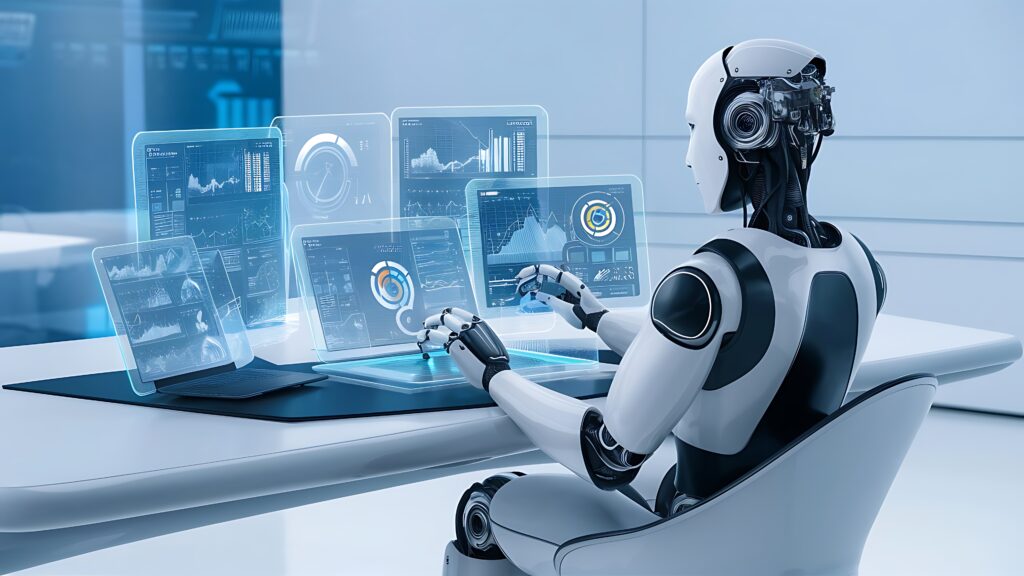Artificial intelligence (AI) today is the main engine of digital transformation, changing the fundamental principles of companies’ work and how they compete in the digital environment. From generative models to intelligent automation tools, organisations are increasingly using AI to stimulate innovation, increase efficiency and improve customer experience.
As business faces the challenges of digital transformation, AI becomes a key factor in opening up new opportunities: from optimising internal processes and more accurate data-driven decision-making to creating fundamentally new business models. According to research, companies implementing AI-initiatives as part of digital transformation record an increase in operational efficiency of up to 40% and an increase in customer satisfaction by about 30%.
In this blog, we examine how AI accelerates digital transformation, which practical application scenarios have already proven to be effective, which strategic approaches help businesses realise the potential of technology, as well as real examples of companies that have successfully built AI into their transformation path.
What is Digital Transformation?
Digital transformation is a strategic introduction of modern technologies into all aspects of business, which radically changes the way organisations work and the approach to creating value for customers. It’s not just about digitising processes, but about a complete rethinking of business operations, corporate culture and customer experience through the prism of technology.
In fact, digital transformation transforms operational processes through automation and data analysis, while changing business models and opening up new sources of income and value supply. Organisations that actively implement digital change strive to improve customer interaction, making it personalised, seamless and convenient at every stage of contact. This requires the formation of a culture of constant innovation and digital thinking within the company.
These changes are manifested in improving the quality of decision-making, improving customer satisfaction and increasing operational efficiency. A classic example is traditional retail chains that launch e-commerce platforms and use analytics to optimise inventory management. Manufacturing companies, in turn, are implementing IoT sensors and predictive maintenance systems to optimise production. The success of digital transformation for any company depends on technological innovations, strategic planning and cultural changes, which ultimately increases competitiveness in the modern digital economy.
What is AI?
Artificial intelligence (AI) is a computer system capable of imitating the human mind and performing tasks that traditionally require human intelligence. These systems rely on complex algorithms, machine learning and deep learning methods to analyse data, identify patterns and make informed decisions. Today, AI has gone from simple rules to complex neural networks capable of processing natural language, recognising images and solving complex problems.
Modern AI technologies include generative models that create new content, predictive analytics that predict future trends. In business, AI manifests itself through chatbots to support customers, mechanisms of personalised recommendations and intelligent automation that optimises workflows. Continuous training and adaptation allow such systems to gradually increase efficiency, making them indispensable tools for innovation and productivity in the digital age.
The benefits of using AI in digital transformation
- Streamlined Operations and Cost Reduction
AI takes on routine tasks and improves workflows, reducing costs by 25-40%. Intelligent automation covers everything from document processing to quality control, reducing the number of errors, speeding up business processes and freeing up staff to perform strategically important functions. - Data-Driven Decision Making
By analysing huge amounts of information, AI helps to extract practical insights and increases the accuracy of management decisions up to 60%. Machine learning algorithms use patterns and predict trends, which allows companies to plan and reduce risks more effectively. - Enhanced Customer Experience
AI-based services – chatbots, recommendation systems and other tools – provide round-the-clock personalised service, increasing customer satisfaction by 35%. Intelligent algorithms anticipate user needs in advance and offer solutions before they become a request. - Increased Profitability
The implementation of artificial intelligence solutions increases revenue by 15-25% due to process optimisation, the emergence of new sources of income and cost reduction. Automation and smart resource allocation allow you to maximise the use of investments in all business areas. - Advanced Analytics Capabilities
AI systems use both structured and unstructured data. The provide real-time predictive and in-depth analytics. This approach helps companies better understand the market and strengthen their competitive positions. - Unified Customer Understanding
AI forms complete 360-degree customer profiles, combining information from different channels of interaction. This increases customer retention by 20-30% and allows you to develop personalised marketing strategies, improving the quality of service.

Technologies in AI transformation
- Natural Language Processing (NLP)
Use machines to understand and generate human language, powering chatbots and content analysis with 40% improved communication efficiency. Organizations implement NLP for faster customer service response times and higher satisfaction rates through automated interaction and document processing. - Computer Vision
Analyzes visual information with 99% accuracy in quality control, retail automation, and security systems. Enables cashierless stores, automated inventory management, and enhanced manufacturing inspection processes through real-time visual data processing. - OCR and Digitization
Converts physical documents to digital formats, cutting manual data entry by 90%. Creates searchable document repositories that streamline information access and improve workflow efficiency across organizations through automated document processing. - IoT Integration
Connects physical devices with AI systems for real-time monitoring and predictive maintenance. Manufacturing facilities achieve 30% reduction in maintenance costs, while smart buildings optimize energy usage through continuous data collection and analysis. - AI-Enhanced Automation
Manages complex workflows and repetitive tasks, reducing processing times by 50-70% with higher accuracy. Combines RPA with AI to handle sophisticated business processes, allowing human workers to focus on strategic initiatives. - Expert Systems
Artificial intelligence is able to reproduce human experience in narrow areas, which increases the accuracy of solutions by 40%. This technology is especially useful in health care and financial planning, where it forms recommendations based on a comprehensive data analysis. - Generative AI
Creates content and designs based on learned patterns, accelerating creation processes by 60%. Revolutionizes creative workflows and innovation cycles through automated content generation and design iteration. - Big Data Analytics
Processes massive datasets for pattern recognition and insights, delivering 25% operational efficiency improvements. Enables predictive modeling and real-time decision support across business functions through advanced data processing capabilities.
How AI is driving digital transformation
- Predictive Analytics for Decision Making
Enterprise AI systems analyze historical and real-time data to forecast trends with 85% accuracy. Organizations report 40% faster strategic decisions and 35% cost reduction through AI-powered analytics that process multiple data streams simultaneously for market insights and risk assessment. - AI-Driven Customer Support
Advanced NLP systems handle 80% of customer inquiries autonomously, learning from each interaction to improve response accuracy. Organizations achieve 40% faster resolution times and 35% higher satisfaction through AI support that adapts communication styles to individual customers. - Building AI Capabilities
Companies can invest 15-20% of IT budgets in AI infrastructure with the focus on cloud computing, data lakes, and specialized talent. Successful implementations require robust data governance frameworks, continuous learning programs, and scalable technical architecture - Operational Efficiency
- Next-generation automation reduces manual processes by 60% while improving accuracy to 85%. Manufacturing sectors report 30% efficiency gains through AI-driven optimization that identifies and eliminates bottlenecks in real-time.
- Customer Experience Enhancement
AI engines analyze thousands of touchpoints simultaneously, creating dynamic profiles for real-time personalization. Companies achieve 40% higher engagement and 35% increase in customer lifetime value through AI-driven experience optimization. - Marketing Strategy Transformation
Deep learning platforms are able to analyse consumer behaviour across several channels at once and predict their needs with an accuracy of up to 75%. Thanks to this, companies note an increase in conversion by almost 50% due to hyperpersonalisation and automatic optimisation of marketing campaigns. - Ethical Considerations
Advanced governance frameworks ensure responsible AI usage through bias detection, transparency protocols, and regular audits. Organizations implement explainable AI systems with continuous monitoring for fairness and accountability. - Cybersecurity Enhancement
Modern AI security processes millions of threat signals in milliseconds, achieving 95% prevention rates. Systems continuously adapt to new attack patterns, reducing breach detection time by 60% through predictive threat analysis. - Smart Inventory Management
AI inventory systems incorporate diverse data sources to predict demand with 90% accuracy. Companies report 30% reduction in carrying costs while maintaining optimal stock through AI-driven forecasting that adapts to market dynamics. - Intelligent Process Automation
IPA combines RPA with cognitive capabilities, reducing processing times by 70% with 90% accuracy. This transformation enables complex decision-making previously requiring human intervention, while continuously optimizing workflows through machine learning.
Examples of AI-Influenced Digital Transformation
- Conversational AI in Banking
JPMorgan’s COIN (Contract Intelligence) software analyzes commercial loan agreements in seconds versus 360,000 hours of lawyer time annually. The bank reports 99% accuracy in document review and 80% reduction in loan processing time. - AI-Powered Healthcare Diagnostics
Mayo Clinic’s AI algorithms analyze medical data with 95% accuracy in detecting conditions. Their solutions processes patient records to predict complications 48 hours earlier than traditional methods, reducing critical care admissions by 25%. - Retail Inventory Optimization
Walmart’s AI system manages inventory across 4,700 stores with 90% accuracy in demand forecasting. Smart algorithms reduced out-of-stock items by 40% while cutting excess inventory costs by 30%. - Manufacturing Predictive Maintenance
Siemens implemented AI-driven predictive maintenance, reducing unplanned downtime by 50%. This tool analyzes sensor data from machinery to predict failures 92% of the time, saving $10 million every year per plant. - Customer Experience Personalization
Netflix’s recommendation engine, powered by AI, drives 80% of content discovery. The system processes viewing patterns to create personalized experiences, resulting in 35% higher engagement and 25% reduced churn. - Cybersecurity Enhancement
Microsoft’s AI security system processes 24 trillion signals daily, identifying and preventing threats with 98% accuracy. The system reduced average threat detection time from 50 days to under 1 hour.
What is the Future of AI in Digital Transformation?
The future of AI in digital transformation opens the way to breakthrough changes in all areas. With the development of quantum computing and the improvement of neural networks, AI will be able to solve more complex problems and predict events more accurately.
Among the key areas are: the use of peripheral computing for real-time data processing, a deeper understanding of natural language to bring interaction closer to the human level, as well as the development of generative technologies. Companies will be able to rely on autonomous systems that will make decisions and instantly adapt to changing conditions.
By 2025, about 75% of enterprises are predicted to shift from piloting to operationalizing AI. This will drive the emergence of AI-first business models, where artificial intelligence becomes central to operations rather than supplementary. Organizations will focus on ethical AI development, emphasizing transparency and responsible implementation while managing the growing intersection of AI with human workforce capabilities.
Conclusion
Artificial intelligence today has become a cornerstone of digital transformation, radically changing the way companies work and their competitive strategies. Companies that have already implemented AI have noticed noticeable improvements in operational efficiency, customer experience, and innovation potential, and successful projects show an average of up to 300% return on investment.
Technologies will be able to realise their potential only with a competent approach: reliable infrastructure, thoughtful integration of solutions and openness to new opportunities are required. With the development of quantum computing and neural networks, ethical issues and training of specialists to remain sustainable are becoming increasingly important.
Success in the AI-driven future requires a balanced approach combining technological innovation with human expertise. Organizations that embrace this transformation while maintaining focus on responsible AI implementation will lead their industries in the coming decade.




